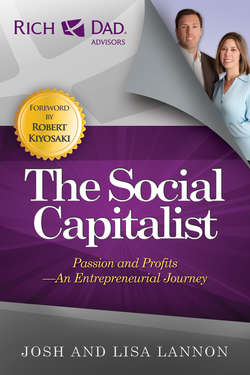Читать книгу The Social Capitalist - Josh Lannon - Страница 13
На сайте Литреса книга снята с продажи.
Josh’s Story
ОглавлениеIn 1999, Lisa and I saw the movie The Matrix. It’s the story of Neo, a computer programmer, who learns that the world he lives in is nothing but an illusion created by computers to subdue people. Throughout the course of the movie, he fights, with the help of others, to free himself from this web of deceit, called “The Matrix,” and live free in a true reality.
Science fiction isn’t really our thing, but for some reason the film haunted us. It had nothing to do with its elaborately choreographed fight scenes and cutting-edge special effects. It was that Lisa and I had each been brought up feeling as if our lives were predetermined, or programmed for us, and we’d both always felt frustrated by the pressure to conform. We just couldn’t shake the feeling that we were, in a sense, in our own matrix, and both of us felt the urge to break free.
I had been that kid in class who maddeningly questioned everything my teacher (and my parents, for that matter) said. Never content with simply doing what I was told and accepting the boundaries set for me, I drove teachers so nuts that after a while, they’d eventually look at me and say, “Please, just be quiet and do your work, okay?”
It was a kind of torture for me to sit in school for hours, and that played out in my grades, which were usually low, if not failing. I felt like I was outside with my face pressed up against the window, but no matter how hard I knocked or yelled, no one noticed me, so I never could join their conversation.
At the schools I attended in Southern California, I began to develop a reputation among teachers, who described me with words like “disruptive,” “doesn’t apply himself,” and even “learning disability.” My parents heard these words and took me to medical professionals, who put me on medication that would help me to calm down and “focus.”
I became convinced at an early age that I just wasn’t cut out for school, and since I already felt like I didn’t fit in, I embraced it, became almost proud of it. If they didn’t want me to fit in, then I didn’t need them. I did whatever I could not to fit in. I skipped a lot of school, was referred to by the A students as “a slacker” and “a stoner,” and eventually just quit school altogether. If putting in twelve years of school, attending four years of college, and getting a “good job” were their formula for success, then, I figured, I just wouldn’t be successful.
But I had come from a family of nightclub owners, so I had access to another world – a world I had often overheard the adults talking about, and which my classmates had never seen. At age 11, I had my first drink, and finally, finally, I felt like I fit in. In this world, there were people like me, people in pain, people who had been unfairly labeled, people who didn’t fit the mold. In this world, we’d found a way to deaden that pain and eliminate our stress. While this world felt comforting and familiar to me, it was also somehow thrilling. And since it had been good enough for my father, I believed that it was meant for me, too.
My dad, who has, to date, owned a total of fourteen nightclubs in California, Hawaii, and Las Vegas, hired me when I was 19 as a bar back at Dylan’s Dance Hall and Saloon in Vegas, where I stocked the bar with liquor, ice, and supplies. It was a menial job, but I absorbed every bit of information I could. I worked hard and became the master of my work. I took pride in keeping the bars fully stocked and delivering three cases of beer at a time, zig-zagging though the crowded nightclub. I knew that if I did a good job, I could work my way up to bartender, make good money, and attract the older girls who came to drink there. Playing in that adult underworld, I felt like I could win in this world.
